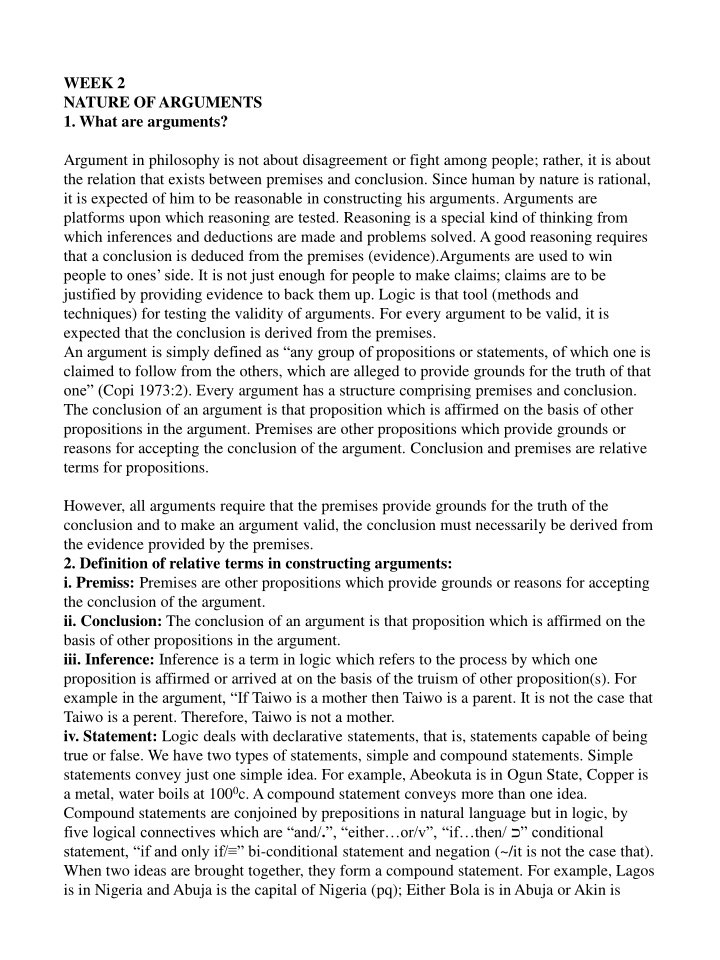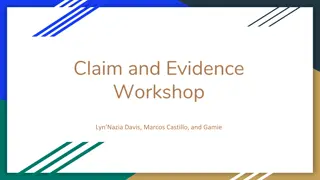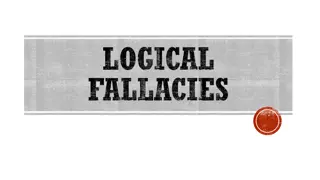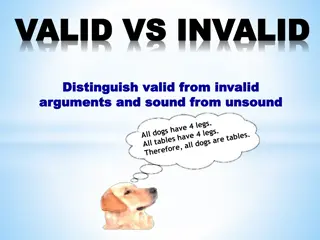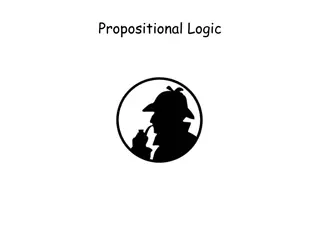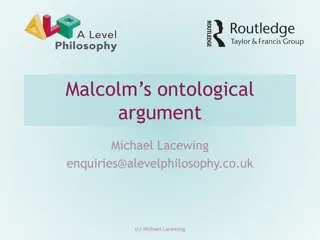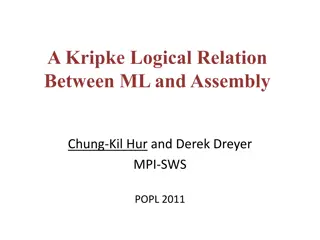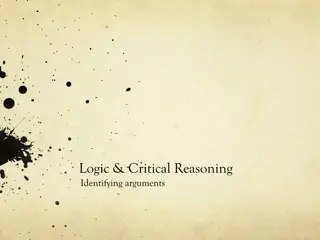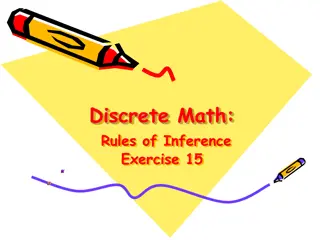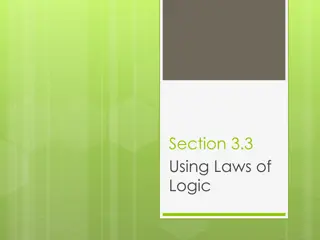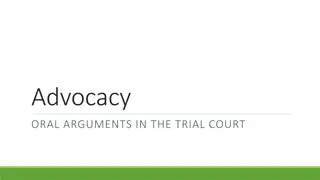Nature of Arguments and Logical Structure
Argument in philosophy focuses on the relationship between premises and conclusions, requiring rationality and evidence for justification. Learn about the components of arguments, such as premises, conclusions, inference, and propositions, to understand the logical structure of reasoning.
Download Presentation

Please find below an Image/Link to download the presentation.
The content on the website is provided AS IS for your information and personal use only. It may not be sold, licensed, or shared on other websites without obtaining consent from the author.If you encounter any issues during the download, it is possible that the publisher has removed the file from their server.
You are allowed to download the files provided on this website for personal or commercial use, subject to the condition that they are used lawfully. All files are the property of their respective owners.
The content on the website is provided AS IS for your information and personal use only. It may not be sold, licensed, or shared on other websites without obtaining consent from the author.
E N D
Presentation Transcript
WEEK 2 NATURE OF ARGUMENTS 1. What are arguments? Argument in philosophy is not about disagreement or fight among people; rather, it is about the relation that exists between premises and conclusion. Since human by nature is rational, it is expected of him to be reasonable in constructing his arguments. Arguments are platforms upon which reasoning are tested. Reasoning is a special kind of thinking from which inferences and deductions are made and problems solved. A good reasoning requires that a conclusion is deduced from the premises (evidence).Arguments are used to win people to ones side. It is not just enough for people to make claims; claims are to be justified by providing evidence to back them up. Logic is that tool (methods and techniques) for testing the validity of arguments. For every argument to be valid, it is expected that the conclusion is derived from the premises. An argument is simply defined as any group of propositions or statements, of which one is claimed to follow from the others, which are alleged to provide grounds for the truth of that one (Copi 1973:2). Every argument has a structure comprising premises and conclusion. The conclusion of an argument is that proposition which is affirmed on the basis of other propositions in the argument. Premises are other propositions which provide grounds or reasons for accepting the conclusion of the argument. Conclusion and premises are relative terms for propositions. However, all arguments require that the premises provide grounds for the truth of the conclusion and to make an argument valid, the conclusion must necessarily be derived from the evidence provided by the premises. 2. Definition of relative terms in constructing arguments: i. Premiss: Premises are other propositions which provide grounds or reasons for accepting the conclusion of the argument. ii. Conclusion: The conclusion of an argument is that proposition which is affirmed on the basis of other propositions in the argument. iii. Inference: Inference is a term in logic which refers to the process by which one proposition is affirmed or arrived at on the basis of the truism of other proposition(s). For example in the argument, If Taiwo is a mother then Taiwo is a parent. It is not the case that Taiwo is a perent. Therefore, Taiwo is not a mother. iv. Statement: Logic deals with declarative statements, that is, statements capable of being true or false. We have two types of statements, simple and compound statements. Simple statements convey just one simple idea. For example, Abeokuta is in Ogun State, Copper is a metal, water boils at 1000c. A compound statement conveys more than one idea. Compound statements are conjoined by prepositions in natural language but in logic, by five logical connectives which are and/. , either or/v , if then/ conditional statement, if and only if/ bi-conditional statement and negation (~/it is not the case that). When two ideas are brought together, they form a compound statement. For example, Lagos is in Nigeria and Abuja is the capital of Nigeria (pq); Either Bola is in Abuja or Akin is
in London (p v q); if Bola puts to bed then Bola is a mother (p q); Akin is a father if and only if Bola is the mother the baby (p q). Logic deals with affirmative statements alone, that is, statements that can either be affirmed or denied. The way statements are denied in logic differs from the way they are denied in ordinary natural language. We negate propositions in logic by stating it is not the case that . So, if you want to say that Bayo is not a man, it will be stated logically as it is not the case that Bayo is a man or if you want to deny that Lagos is in Nigeria and Abuja is the capital of Nigeria, it will be stated as it is not the case that both Lagos is in Nigeria and Abuja is the capital of Nigeria . This shows that the whole compound statement is negated. Statements are negated in logic this way so that it will be easier to manipulate them when testing for the validity of an argument. v. Proposition: A proposition is a statement that is either true or false/ either asserted or denied. Proposition differ from question, command or exclamation. Questions are asked, commands given and exclamations uttered but none of them can be affirmed or denied (none can be judged to be either true or false). A proposition is a term otherwise used for a statement in an argument and it could either be a premise or a conclusion depending on the position it occupies in a particular argument. If a proposition is a claim it becomes the conclusion, if it provides reason or support to others in establishing a claim, it becomes a premise. vi. Truth: As truth is to a statement/proposition so is validity to an argument. Every declarative statement in logic has a truth value, which means, it is either true or false. vi. Validity:An argument is correct or valid if the logician examines the initial proposition(s)/premise(s), the final proposition (claim/conclusion) and the relationship between them and make a deduction from the truth of the premises to establish the conclusion, then such an argument so constructed is said to be valid. 3. Types of arguments: Apparently, there are two types of arguments, inductive and deductive arguments. Inductive Argument: An argument is claimed to be inductive if its premise(s) only provide some support but do not guarantee its conclusion. Inductive argument is structured in such a way that from some set of factual propositions (premises), a conclusion is inferred. For example, This ripped tomato is red; That other ripped tomato is red Therefore, all ripped tomatoes are red. Copper, a metal conducts electricity. Bronze, a metal conducts electricity. Aluminum, a metal conducts electricity Therefore, all metals conduct electricity. I bought bread in the shop on Tuesday and it was stale. I bought bread in the shop on Wednesday and it was stale. I bought bread in the shop on Thursday and it was stale. Therefore, if I buy a loaf of bread in the shop by Friday it will be stale. In the first throw, the coin turned tail. In the second throw, the coin turned tail. In the third throw, the coin turned tail.
Therefore, in the fourth throw, the coin will turn tail. From the above examples, it should be noticed that the first sets of proportions (premises) give support to the last stated proposition (conclusion) either strongly or weakly as the case may be. The evidence provided in inductive arguments only makes the argument either strong or weak. The conclusion is always found to be more informative than the premises. Inductive reasoning has its root in the notion of uniformity of nature which holds that tomorrow will be like the past. Scientists, as defenders of uniformity of nature, do point out that many events and processes in nature occur the same way over and over again to eternity. For example, because it has been observed over times that the following happens, the scientists thus conclude that: (a). (c) ones, Lightning is followed by thunder. Chickens lay eggs, but goats do not. (b) Iron rusts whereas gold does not. (d) Mammals suckle their young While reptiles do not. Scientists on the basis of uniformity of nature projects and predicts what happens in the future. They rely on the fact that the future shall always be like the past and the present will repeat itself. Looking at the examples above, we discover that there is nothing in the premises of the arguments that shows that their conclusions are necessarily certain or is there anything in the premises to compel us to accepting that their conclusions are true. For example, observing two instances of ripped tomatoes do not guarantee the fact that other ripped potatoes will be red. The premises only support the conclusion but do not guarantee that all ripped tomatoes would be red. There is nothing that guarantees us that in future a ripped tomato will be red. It is possible for the scientists in the future to come up with specie of tomatoes that will not be red when ripped. Again, in the other example, there is nothing in the premises that assures us that the next loaf of bread I will buy will be stale; rather, the premises only support the conclusion, it does not guarantee it. There is only a 50% chance of buying a staled-loaf of bread in the shop on Friday. The support offered by the premises to the conclusion in inductive arguments can either be high (strong) or low (weak) or none at all. The premises of inductive arguments offer high/low or no degree of probable support to the conclusion. Let s look at the following Examples: i. All Nigerians are corrupt (may be 99%) Abacha is a Nigeria. Therefore Gen Abacha is corrupt * The premises here only offer high/strong degree of support to the conclusion. ii. Akin studied hard and passed his examination. Dele studied hard and passed his examination. Mabel studied hard and passed her examination. Therefore, all who study hard will pass their examination. * The premises offer a low degree of support to conclusion.
iii. Iron, a metal expands when heated. Copper, a metal expands when heated. Bronze, a metal expands when heated. Therefore, all metals rust when exposed to air. *The premises do not support the conclusion at all. Types of Inductive Arguments: There are two types of inductive arguments, those that move from particular to general. The premises are particular instances, while the conclusion is general. Example (ii) and (iii) suffice. those that goes from particular to particular. Here, the premises and the conclusion are made up of particular instances. Examples (iii) and (iv) above suffice. Therefore, it is not the case that inductive inferences go only from particular to general. Deductive Argument: In deductive argument the premises not only support but guarantee its conclusion: the premises provide absolutely conclusive grounds for the truth of its conclusion. A deductive argument is valid or correct if its premises and conclusion are so related to the extent that it is impossibly for the premises to be true and the conclusion false. Deductive argument is valid if its conclusion is necessarily and logically drawn from its premise(s). Deductive argument is most particularly about clarifying the relationship that exists between the premises and the conclusion. Every deductive argument is either valid or invalid because they are only about the logical relation existing between premises and conclusion. Examples of deductive arguments includes, 1. Those that go from general to particular i. All women are liars responsible Toyin is a woman a husband Therefore, Toyin is a liar responsible. All husbands are Akin is Therefore, Akin is ii. All metals conduct electricity Iron rod is a metal a husband Therefore, Iron rod conducts electricity All husbands are responsible Akin is Therefore, Akin is responsible. iii. All human beings are mortal Tade is a human being Therefore, Tade is mortal mammal All dogs are mammal Bingo is a dog Therefore, Bingo is
2. Those that go from general to general i. All women are human beings are educated All mothers are women academicians Therefore, all mothers are human beings scholars are educated All academician All scholars are Therefore, all ii. All human beings are mortal are wayward All UNAABites are human beings are gutter boys Therefore, all UNAABites are mortal Therefore, all Yahoo boys are wayward iii. All physicians are University graduates All members of Nigerian Medical Association are physicians Therefore, all members of Nigerian Medical Association are University graduates. 3. Those formulated according to Rules of Inference (one of the laws of logic) All gutter boys All Yahoo boys
Modus Ponens: i. If shade puts to bed then shade is a mother Shade puts to bed (antecedent affirmed) Therefore, Shade is a mother affirmed) p q (conditional statement) p /q (consequent Note: necessarily follows, else we would be committing fallacy of affirming the antecedent. if the antecedent of a conditional statement is true and affirmed, then its consequent Modus Tollens: i. If Shade puts to bed then Shade is a mother Shade is not a mother denied) Therefore, Shade does not put to bed p q (conditional statement) ~q (consequent /~p (antecedent denied) Note: affirmed in the conclusion, else, we would be committing fallacy of affirming the consequent. if the consequent of a conditional statement is denied, then its antecedent cannot be Hypothetical Syllogism: i. If UNAAB is in Abeokuta then UNAAB is in Ogun State if UNAAB is in Ogun State then UNAAB is in Nigeria Therefore, if UNAAB is in Abeokuta then UNAAB is in Nigeria ii. If Joke is wayward then Joke is dangerous p q If Joke is dangerous then Joke is unmanageable q r Therefore, if Joke is wayward then Joke is unmanageable p q q r / p r / p r 4. Differences between Inductive and Deductive Arguments Inductive Argument Deductive Argument 1. Premises only provide some support to the conclusion but do not guarantee it. Premises do not only support but also guarantee the conclusion. 2. Inductive reasoning offers at best a very high degree of probability (up to 99.99%) but not certainty. E.g. Logic helps us to identify and eliminate fallacies. Logic helps us to predict with precision. Logic sharpens people s critical awareness. Logic helps us in taking rational decisions. Logic is vital in clarifying and evaluating our language. Logic helps us in efficient planning. Logic is the money of the mind Therefore, Logic should be taken and passed by all University students. Deductive reasoning offers certainty. E.g. All ladies are lairs
Shade is a lady Therefore, Shade is a lair. 3. There is no limit to the number of its premises. Limited to maximum of two (2) premises. 4. Classified as good or bad, weak or strong; adequate or inadequate. Classified as valid or invalid; sound or unsound. 5. Conclusion contains more information that the premises. It even projects into the future. Conclusion contains less information than the premises. There is no information in the conclusion which is not already contained in the premises. 6. Are of two types: i. Those that go from particular to general; and ii. Those that go from Particular to particular. Are of three types: Those that go from General to particular; and Those that go from General to general; and Those formulated according to the Rules of Inference (Laws of Logic). 7. Relies heavily on experience, facts, content, evidence, etc. It does not rely on evidence, experience or observation to establish its conclusion. Emphasis is on the structure of the argument rather than its content. 8. Inductive reasoning is the method of science and scientific theories took their origin from it. It is not the method of science; hence, not so useful to scientists. Test Questions: What is an argument? Make distinctions between a proposition and a sentence. Why does logic restrict its language to declarative statements alone? Mention a few premise indicators and conclusion indicators. Mention some of the general characteristics of inductive and deductive arguments? What are their differences?
